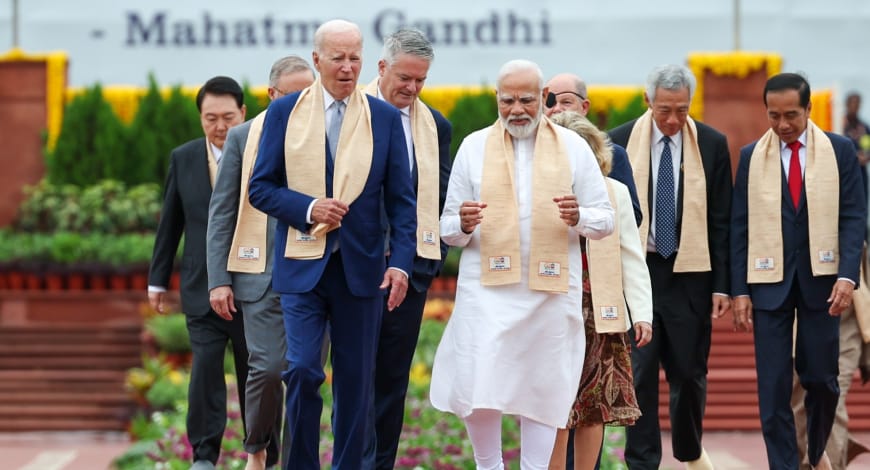Reading the G-20 Leaders’ Declaration (issued at their annual summit last weekend) alongside the carping of several Western analysts makes one feels like Alice in Wonderland.
Read in its entirety, the long and detailed Declaration shows a great deal of thought, inputs, and negotiations. Different lines in many of the paragraphs seem to reflect the concerns of one or other member or group of members — which indicates a massive international exercise.
And yet, although it included different viewpoints, it was adopted with amazing alacrity by all 20 members, and others who participated. There was no dissent.
WATCH: ‘India’ or ‘Bharat’ : Youngsters of the Nation Debate it Out
Not just that, the detailed statement in six parts, ranging from ‘Green Development’ to ‘International Taxation,’ was adopted on the very first day of the summit, even though naysayers had dourly predicted that there might be no Declaration at all — or, after much distressed haggling and begging, a pedestrian marker of an unproductive meeting.
They seemed to believe that the West would be able to stymie a Declaration that did not reflect Western antipathy against Russia.
Instead, the Declaration took that bull by the horns, clearly asserting near the beginning that ‘the G20 is the premier forum for international economic cooperation,’ and that, ‘while the G20 is not the platform to resolve geopolitical and security issues, we acknowledge that these issues can have significant consequences for the global economy.’
So: ‘We highlighted the human suffering and negative added impacts of the war in Ukraine with regard to global food and energy security, supply chains, macro-financial stability, inflation and growth,’ and appreciated efforts by Turkey and the UN to get grains and fertilisers from the war zone to the rest of the world, particularly Africa.
READ MORE: Medical fraternity in Kerala scrambles to demystify ‘index’ Nipah cases
In this light, the Declaration gave an even-handed call to ‘ensure the immediate and unimpeded deliveries of grain, foodstuffs, and fertilizers/inputs from the Russian Federation and Ukraine.’ Further, ‘emphasizing the importance of sustaining food and energy security, we called for the cessation of military destruction or other attacks on relevant infrastructure.’
Mealy-mouthed responses
Despite the clarity of this document, which was explicitly focused on the global economy, several quibbling Western analysts wouldn’t let go of their cavil. Some of them behaved as if the grouping was meant to be an extended G-7 Western bloc, and so should have castigated Russia for its Ukraine operations. They did not seem to notice the assertion that the G-20 is ‘the premier forum for international economic cooperation’ – an oblique way of saying that the Western G-7 is, or will soon be, passé.
With a Trudeau-esque air of patronising white supremacy, one professor and Fellow at a prominent US think-tank tweeted that the ‘G-20 statement is basically irrelevant (just as the absence of a statement would have been). It was important for India and so people compromised as a nice gesture to India. The war goes on; papering over some language about that fact demonstrates little about, well, anything.’
READ MORE: Sun rises to find new scam in Bengal every day: Dilip Ghosh
Such vapid commentary seemed to suggest that a G-20 statement could stop the war — and that this war is far more important than those that have raged in Yemen, Afghanistan, and Iraq. (Could this be because white people are dying and becoming refugees?)
Ignoring such cringe-worthy prods, the G-20 stated, quite correctly: ‘In line with the UN Charter, all states must refrain from the threat or use of force to seek territorial acquisition against the territorial integrity and sovereignty or political independence of any state.’
Contrast to Bali
The West had evidently insisted that the previous Declaration, issued at last year’s summit in Bali, was more forceful, and must have wanted that reiterated. The Bali declaration had noted that members expressed several different views. However, it quoted ‘the UN General Assembly, which, in Resolution No. ES-11/1 dated 2 March 2022, as adopted by majority vote (141 votes for, 5 against, 35 abstentions, 12 absent) deplores in the strongest terms the aggression by the Russian Federation against Ukraine and demands its complete and unconditional withdrawal from the territory of Ukraine.’
The Bali Declaration went on to state: ‘Most members strongly condemned the war in Ukraine and stressed it is causing immense human suffering and exacerbating existing fragilities in the global economy – constraining growth, increasing inflation, disrupting supply chains, heightening energy and food insecurity, and elevating financial stability risks.’
READ MORE: Annamalai is ‘hero and savior’ of Tamil Nadu: BJP leader
The New Delhi Declaration stopped short of restating either the condemnation of some or deploring Russia’s operations by all members, only ‘recalling the discussion in Bali.’ Without doubt, several viewpoints must have been expressed during the discussion, whatever the final Declaration stated.
It then reiterated our national positions and resolutions adopted at the UN Security Council and the UN General Assembly. Those included the one which was explicitly quoted in Bali, but this Declaration cited no such express criticism of Russia, a long-time friend and armaments partner of India.
READ MORE: ‘Alien corpses’ displayed at Congressional hearing in Mexico
Stating that ‘emerging markets took a particular lead on composing the New Delhi draft,’ external affairs minister Dr S Jaishankar added that ‘Bali was Bali, this is Delhi.’ He pointed out that, after Indonesia and India, the G-20 presidency was moving to other important developing countries, Brazil and South Africa.
Just like the Bali Declaration, last week’s Declaration included Prime Minister Modi’s assertion: ‘Today’s era must not be of war.’
(David Devadas is a seasoned journalist with a deep understanding of the Kashmir issue. He is the author of The Story of Kashmir and The Generation of Rage in Kashmir (OUP, 2018). He also analyses politics, geopolitics and security matters.)
Disclaimer: Views expressed above are the author’s own.










